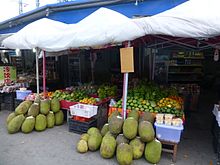Southeastern Yunnan is in China.
Regions
[edit]
- Honghe Prefecture - literally translates into the "Red River" prefecture. The prefecture does, in fact, straddle the river and while the north of Honghe is generally warm and arid, the south is generally tropical and green. No matter where you are within the prefecture, however, you can rely on some fantastic mountains ranges or hilly terrain
- Yuxi Prefecture
Cities
[edit]- 1 Chengjiang - city on the northern shore of Fuxian Lake known for its World Heritage-listed fossil site
- 2 Gejiu - tin miners' city in Honghe Prefecture
- 3 Hekou - a gateway to Vietnam
- 4 Jianshui - a historic city, with Southern China's largest Temple of Confucius
- Kaiyuan - county level city in Honghe Prefecture
- Luxi
- Mengzi - capital of Honghe Prefecture
- Mile
- 5 Shiping (石屏) - the culture the Yi People
- 6 Tonghai - mosques around the shores of Lake Qilu
- 7 Yuanyang - famous for Hani people's terrace rice fields
- 8 Yuxi - capital of Yuxi Prefecture, home to the biggest tobacco factory in Asia
Other destinations
[edit]
- Kunming–Hai Phong Railway (Meter-gauge Kunming–Hekou Railway). Constructed by French capital and Chinese labor at the beginning of the 20th century, the Yunnan section of the meter-gauge railway connecting Yunnan and Vietnam is a feat of engineering. Although there is no passenger service on most of this line anymore (trains run on the standard-gauge line instead), the railway is preserved and continues to have some limited use for freight. A commuter service on a small section of this line still operates in Kunming, and a tourist train runs on a side branch of this railway in Jianshui.
Understand
[edit]Get in
[edit]
The old narrow-gauge railway linking Kunming with Hekou on the Vietnamese border sees no passenger service along most of its length. However, a new standard-gauge railway has been completed in the early 2010s between Kunming and Hekou. Stops include many of the southeastern Yunnan cities: Yuxi, Tonghai, Jianshui, Mengzi, Hekou. There are about half a dozen trains a day in each direction on the Kunming-Mengzi section; fewer, south of Mengzi. Most of the train stations on the new railway are a fairly long way out of the towns they serve, but local bus service between the station and the town is usually available.
Mengzi has an airport as well.
Get around
[edit]By train
[edit]
Trains can be used to move between the cities on the new (standard-gauge) Kunming-Hekou line (via Kunyang, Yuxi, Tonghai, Jianshui, and Mengzi). Thanks to extensive tunneling, the railway is straighter than most roads, which makes a train trip faster and more pleasant than one by bus. Note that in most cities, the train station is quite a way out of town, but bus service to central city is usually available.
There is a century-old old narrow-gauge, 100 km or so to the east of the new standard-gauge line, but it has no passenger service.
By bus
[edit]Buses can be used to travel everywhere else; Mengzi is the region's main hub.
By bicycle
[edit]
Traveling by bicycle in SE Yunnan is possible, and often quite rewarding. Most cities are within a day's trip from one another (60-80 km) along a provincial highway (省道). As cities are usually in river or lake valleys, riding between two cities will involve climbing at least a couple of hundred meters, and then losing elevation.
The Red River flows in a narrow and deep valley, about 1,000 m below the towns north or south of it, so all the roads descending into it have an impressive series of switchbacks.
Be aware of the combination of the usual hazards of riding in China. When crossing industrial/commercial suburbs of most cities, you'll go through a belt of congested roads, smoke and dust. Once outside of the densely populated area, the traffic is usually low, but the road may have some sections being repaired - or in dire need of repair.
See
[edit]
- The Chengjiang fossil site, inscribed on the UNESCO World Heritage List
- Cultural Landscape of Honghe Hani Rice Terraces - UNESCO World Heritage site since 2013
Do
[edit]- Fuxian lake
Eat
[edit]
Locally produced tropical fruit are available in the southern part of the region. Try local bananas, jackfruit, passion fruit, loquats, and even mangoes. Strawberries are grown in large fields in the northern counties of the region, e.g. around Yuxi.


